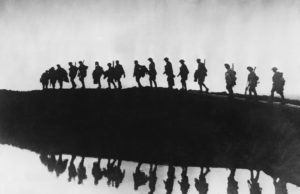
Soldiers in Flanders. Credit: History.co.uk
Nov. 11, 1918. At 11:11am, I will stand as a sign of respect for the men and women who lost their lives in World War One, when Europe tore itself to pieces and the old world died.
We get a lot of WW2 history in the US, and rightly so, given the long shadow it casts. It is important, though, that we devote just as much time to the study of the causes of the first Great War. It does not have an obvious bad guy, certainly not as obvious as its sequel, but that’s precisely why it should be examined in detail.
It was the story of the military juggernaut of Germany and the aging husks of the Ottoman Empire and Austria-Hungary, versus the British seawall, the latest of a succession of French republics/kingdoms/republics, and the somehow still-medieval Empire of Russia.
It was the invasion of neutral Belgium, the rise of the demon of chemical warfare, and destruction of the social fabric of the West.
It was the seedbed of Soviet Russia, Nazi Germany, and America the Superpower.
If you can, I highly highly recommend you listen to Dan Carlin’s Blueprint for Armageddon series. It is one of the best and most accessibly series on WW1 around.
The war was supposed to be over within weeks; it took four years and 39 million casualties, military and civilian. It was supposed to be a fine and dandy display of national pride; it would became the morass of corpses, mud, and blood that inspired the land of Mordor to JRR Tolkein.
Nothing the generals, politicians, or businessmen promised before the war came true, for either side. Men with white gloves and cloth hats charged into machine guns on faulty orders, Empires that lasted for centuries fell apart like cigarette ash, and the modern world was born via untrained cesarean section.
The decisions made by the men and too-few-women prior to world war one were made for the most banal of motives: this hedgerow belongs France, this farmstead belongs to Germany.
The errors were made for the most personal of reasons: the madman who healed the Czar’s son convinced the Czar to go to the front, leaving behind petty nobles and the royal family to the tender mercies of Vladimir Lenin. The Kaiser was born with a deformity of his arm and demanded military credits and accomplishments to prove his manliness and worth after the death of his Grandmother, Queen Victoria.
The effects were even larger off the battlefield: A young veteran sees the vengeance taken by the allies on Germany and filters it through a warped and vile soul, eventually writing Mein Kampf. London Banks are unable to finance the long war so the Allied governments take out loan after loan from the only source of capital: New York, and the transfer of authority, prestige, and cash in the West was began.
A geologist and self-made millionaire who spoke Mandarin used his considerable fortune and organizing skill to provide food relief to abused and flooded Belgium, catching the attention of President Woodrow Wilson. That Herbert Hoover fellow, Wilson must have thought, he knows how to fix things.
Read about WW1. And if you are devastated or exulted by the election of an American president, that’s appropriate and rational, but remember that children fifty years on will live in a world built by the actions you take, or fail to take, now. Have humility in victory, and have courage in loss. The roads on which our grandchildren will walk will follow a path based on the walls and bridges we choose to make here, in this time. As in World War One and at all times, we stand on the fulcrum of history; we *must* push the lever, we have no choice except to decide the direction.




